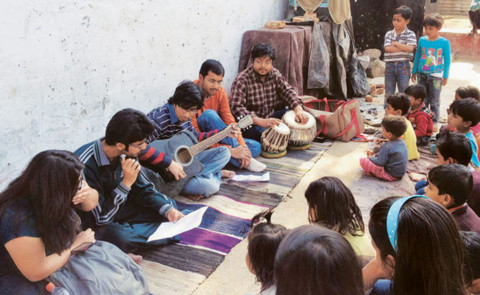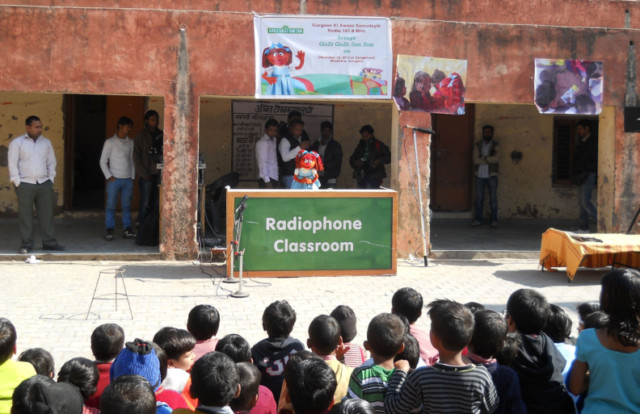
The students of Indian Institute of Technology (IIT)- Delhi, and an NGO, Sesame Workshop, are on a mission to educate rural and slum children. While engineering students teach vocals and musical instruments to children on weekends, Sesame educates them through Galli Galli Sim Sim, a popular educational radio and TV show.
Music Masti was launched a couple of months ago by students, who help underprivileged children living in the slums in Munirka, near IIT campus in Hauz Khas.
The aim is to encourage the hidden musical talent in children who have no means to pursue such activities.
Renu, the daughter of a rickshaw puller, waits excitedly for the weekends, which is when the IITians teach her to play the tabla, while her friends sing popular Hindi film songs. She is among over 40 children who participate in the music sessions.
Sidharth Ranjan, the 21-year-old engineering student says, “Music can be very liberating for these kids who have very limited access to extra-curricular activities. Many of them are extremely talented but they need mentoring and that’s what we are doing.”
He would initially play the harmonica sauntering in the cramped bylanes of the slum. It led children to run out of their homes to see the source of such musical sound. Along with a group of student volunteers, Ranjan would make himself comfortable in the surroundings and play the tabla or sing songs. It set the mood and children soon began shedding their inhibitions.
Coordinator of the music project, Ranjan informs, “The foundation of Music Masti was, in a way, laid two years ago. We have a regular open-air theatre programme, wherein people are introduced to music and they can participate and showcase their talent. At one such show in a slum, a child raised his hand and said he also wanted to play music.”
He was invited on stage and taking a cue from that incident, the team decided to add real meaning and creativity to the lives of these children, so that they too could observe and enjoy life in a healthy manner.
“Just as there’s exposure to music and astronomy for us, we would like to add all such interesting things in their lives too,” he said.
Since the students use their personal musical instruments to tutor children, a special dimension has been added to the programme. Children are taught the basics of music with the help of products that are easily available. For instance: a table is used to learn the tabla and tin containers become a substitute for drums.
“The programme is gradually gaining momentum. Though not all the kids in the slums participate in such events, we see new faces now and then. Some just like to watch, others join in after some time,” Sidharth informed.
Enthused by the response, volunteers from other colleges have also shown the initiative to join hands with the Masti Music group.
A volunteer, Rajesh Pratap states, “It is easy to start a project but difficult to sustain it in the long run. Our mission is to get the kids involved in activities. Given a little impetus, they can excel in their field of interest.”
The programmes are sometimes about awareness as well. Children are made to understand the benefits of education.
Young Sumit learnt the hard way why there’s a need for education. His mother expired a year ago because she could not read the expiration date on a bottle of medicine. Though the family could not make up for the loss, Sumit ensured that he and his younger sibling go to school. Despite his father insisting that Sumit take up sundry jobs, he went ahead and enrolled himself in a government school.
Similarly, Meena hated going to school. But now she not only attends classes regularly, but when she comes back home, she tries to educate her younger sister. The difference in 6-year-old Meena’s mindset is all due to her favourite character Chamki in a radio programme, an offshoot of the television series “Galli Galli Sim Sim” (GGSS), which provides educational content to the underprivileged children in rural areas.
While Chamki and Googly are the main characters, Boombah, Aanchoo, Ahmad Chacha and Doctor Aunty play side roles in the show.
Chamki explains the power and benefits of education and implores children to attend school. Children love the character and at her behest many have started taking care of personal hygiene.
Sesame Workshop India (SWI), the organisation behind GGSS, has impacted its outreach through educational messages. Every year, over 10 million children watch the television series of GGSS, which made its debut in 2006. It is at present broadcast on two of India’s leading children’s channels, Pogo and Cartoon Network, and to increase its reach, is now also transmitted on Doordarshan.
GGSS’ Radiophone Project, which commenced in 2011, reaches out to 1.4 million people in the remote areas of north and central India. Its educational messages are extended through a radio programme aired on All India Radio, community radio stations and applications on new and emerging media such as mobile phones and the internet.
Sashwati Banerjee, managing director, SWI, says, “We use the power of the media to help children reach their highest potential. SWI develops and distributes high-quality and engaging content to reach young children, especially in areas that are beyond the reach of television. By amalgamating technology and storytelling techniques, we have made learning more effective and engaging.”
While new technology develops at a dizzying speed, people living in remote or marginalised communities remain heavily dependent on older technologies. And since it is difficult to penetrate into certain areas, people living there remain bereft of both, facilities and awareness.
Banerjee explains, “Migrant families top this list of neglect. Children in migrant families do not have access to continuous schooling, as they seldom dwell in the same place for long enough to establish a routine. SWI has merged old and new technologies in the Radiophone Project, which brings educational content to children and communities in order to promote their overall development.”
The programme is known to have also brought about changes in the outlook of parents towards their children. She said that a caller told them that he had bought a new game for his children, but they spoiled it in a couple of days. It made him angry and he decided to punish them. But that day, while listening to GGSS over the radio, he reflected on his anger, as the programme made him realise that children tend to make mistakes and it’s the duty of the elders to correct, and not punish, them.
He further added that his children were themselves feeling sad about the game and treated that as a learning experience.
“The programme focuses on delivering thematic messages for children and parents, especially on concepts of literacy, health, hygiene and nutrition. It also provides community members a platform to address the most critical issues in their town,” she informed.
Under the project, 90 GGSS radio episodes in Hindi were broadcast across 10 community radio stations in Uttar Pradesh, Haryana, Madhya Pradesh, Himachal Pradesh and Uttarakhand.
The result: Muskaan heard “The Hungry Dustbin” episode on GGSS and began throwing trash in the dustbin. Her mother Malti always told her not to throw trash all around the house, but Muskaan would refuse to obey. Her attitude changed on listening to the programme, which has made her mother to prompt her daughter to listen to the radio on a regular basis.
Malti says, “In one episode some characters were shown eating corn with great enjoyment. They followed it up by brushing their teeth. The Doctor Aunty advised children to brush their teeth daily before going to bed. All these things are making an impression on Muskaan.”
Supriya Sahu, joint secretary, Ministry of Information & Broadcasting, said, “Community Radio movement in India has taken deep roots. With more than 170 operating community radio stations and more than 200 in the pipeline, the Indian community radio sector is the largest in South Asia.”
This is especially encouraging, as many regions do not have access to television, especially the cable network.
- Nilima Pathak is a journalist based in New Delhi.













